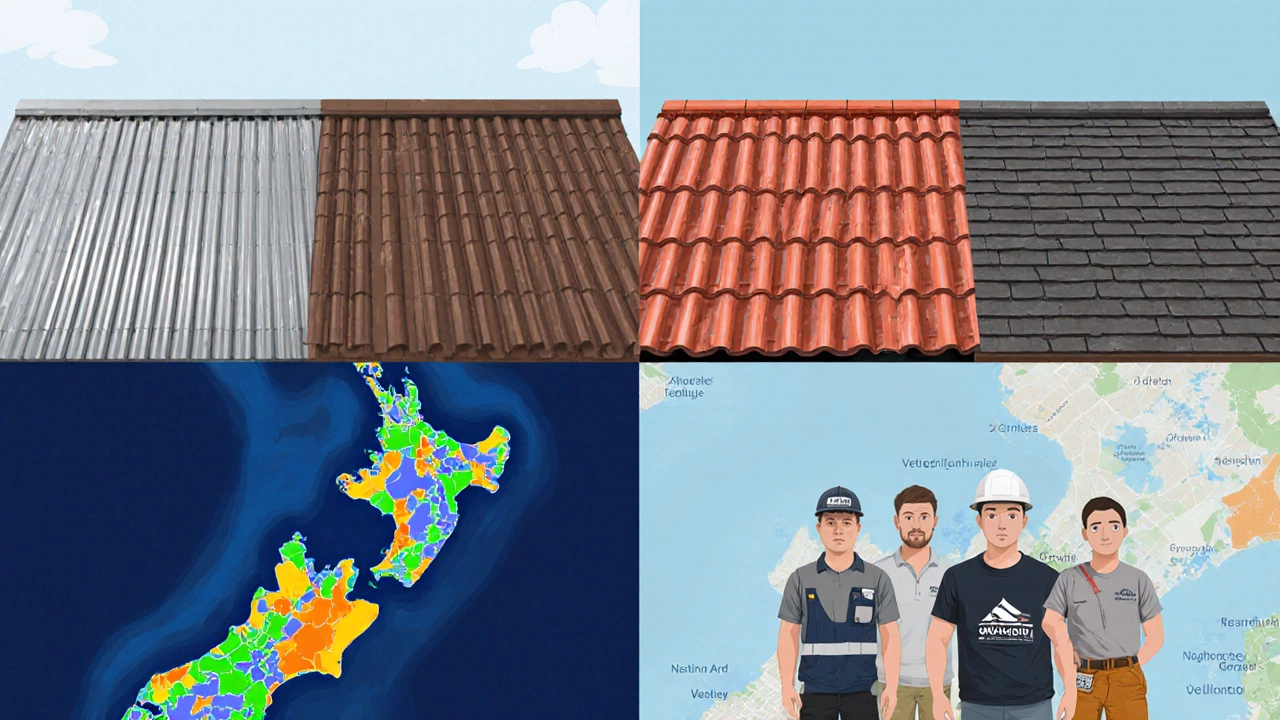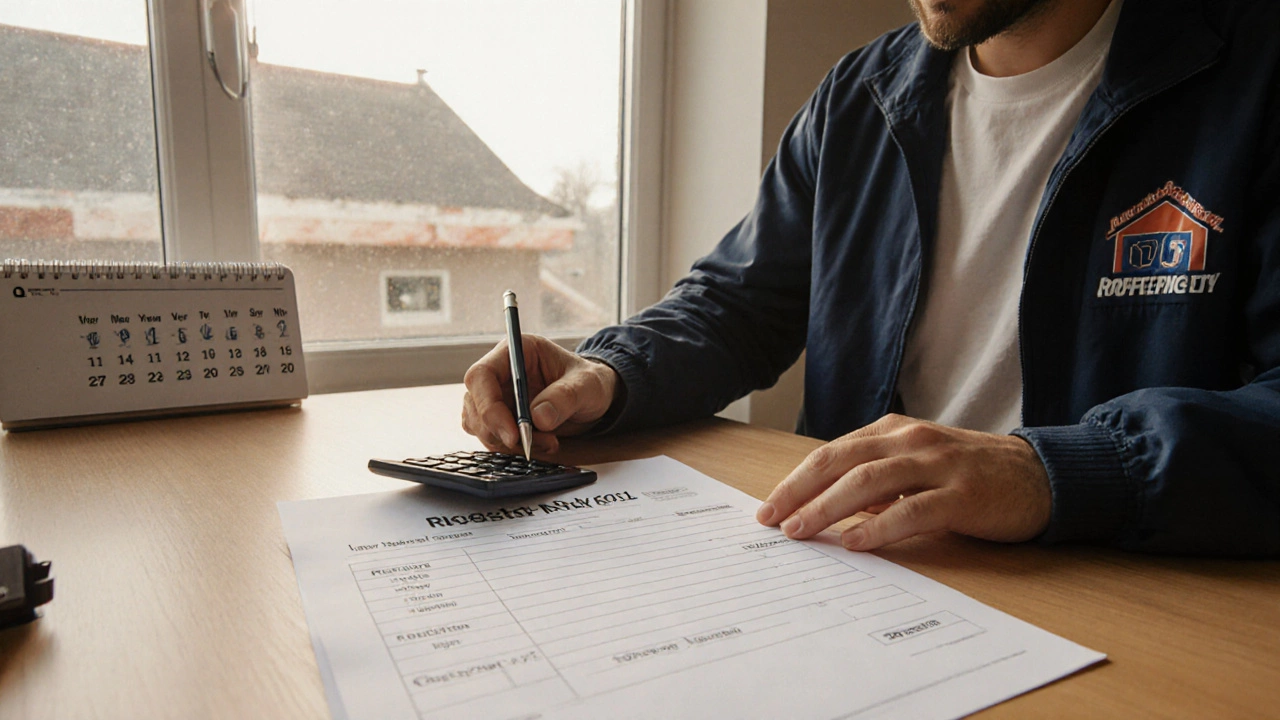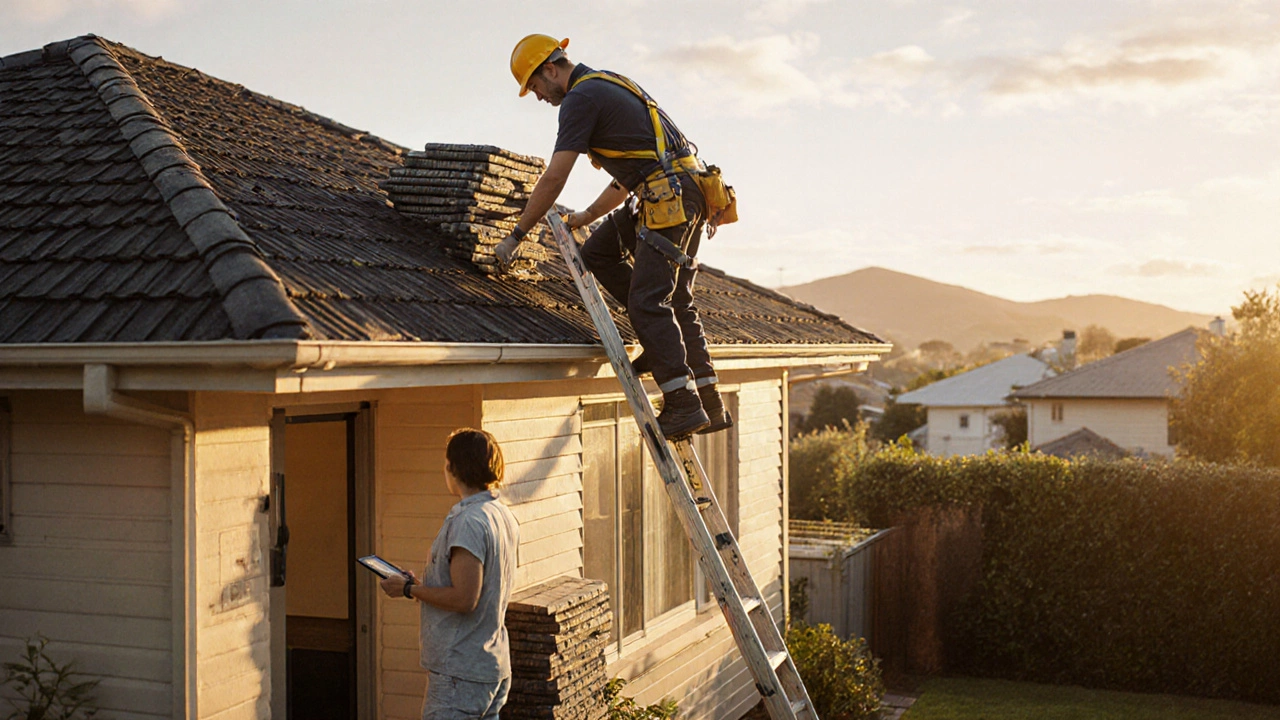Roofing Cost Estimator
Estimated Cost Breakdown
Based on your inputs, here's the estimated cost for your roofing project:
- Hourly Rate:
- Estimated Labor Cost:
- Additional Fees:
- Total Estimated Cost:
Key Takeaways
- National average hourly rate for roofing labor in New Zealand sits between NZ$70 and NZ$115.
- Rates rise 10‑20% in major cities such as Auckland and Wellington and dip 5‑10% in rural areas.
- Material type, roof pitch, and crew experience are the biggest drivers of price.
- Ask for a detailed breakdown - labor, materials, insurance, and disposal - to avoid surprise costs.
- Flat‑rate quotes can be cheaper for simple jobs, while hourly pricing suits complex repairs.
When you’re trying to fix a leak or replace a roof, the first question on most homeowners’ minds is “how much will it cost?” That answer usually starts with the roofing company hourly rate - the amount a roofer charges for each hour of labor. In this guide we break down what you’ll pay per hour across New Zealand, why the numbers differ, and how to read a quote so you never get blindsided.
What Exactly Is an Hourly Rate?
An hourly rate is the price charged for each hour a roofer spends on your project. It typically covers:
- Labor cost - wages, taxes, and any overtime premiums.
- On‑site preparation - setting up scaffolding, safety harnesses, and protective sheeting.
- Travel time if the crew has to drive a long distance.
The rate does not include raw materials (shingles, metal panels, under‑layment) or disposal fees. Those are listed separately on most invoices.
Factors That Influence the Hourly Rate
Several variables push the price up or down. Understanding them helps you compare quotes more fairly.
| Factor | How it affects price | Typical impact (%) |
|---|---|---|
| Roofing material type | Metal, tile, or slate require specialized tools and training. | +10to+25 |
| Roof pitch | Steeper pitches increase safety risk and slow progress. | +5to+15 |
| Crew experience level | Veteran crews charge more but finish faster and make fewer mistakes. | +0to+20 |
| Geographic region | Urban centres have higher living costs; rural areas have lower demand. | -10to+20 |
| Insurance & licensing | Fully insured, licensed companies must charge for coverage. | +5to+10 |

National and Regional Hourly Rates (2025)
Below is a snapshot of what most reputable roofing firms charge per hour across the country. Rates are based on data collected from industry surveys, trade associations, and recent invoices.
| Region | Shingle/Asphalt | Tile/Concrete | Metal |
|---|---|---|---|
| Auckland | NZ$95‑$115 | NZ$105‑$130 | NZ$100‑$125 |
| Wellington | NZ$90‑$110 | NZ$100‑$120 | NZ$95‑$115 |
| Christchurch | NZ$80‑$100 | NZ$90‑$110 | NZ$85‑$105 |
| Hamilton | NZ$75‑$95 | NZ$85‑$105 | NZ$80‑$100 |
| Rural North Island | NZ$70‑$85 | NZ$80‑$95 | NZ$75‑$90 |
| South Island (excluding major cities) | NZ$70‑$90 | NZ$80‑$100 | NZ$75‑$95 |
These numbers are averages. A high‑skill crew working on a steep, multi‑layered metal roof in Wellington can easily command NZ$115+per hour, while a junior team handling a simple shingle repair in a small town may charge as low as NZ$70.
How to Read a Roofing Quote
A well‑structured quote separates each cost component. Look for these sections:
- Labor (hourly rate): The base rate multiplied by estimated hours.
- Materials: Itemised list (shingles, flashing, under‑layment, nails).
- Disposal & haul‑away: Fees for removing old roofing.
- Insurance & licensing surcharge: Usually a flat % or fixed amount.
- Travel / mobilization: One‑time charge if the site is far from the depot.
If any of these line items are missing, ask for clarification before signing.
Hourly vs. Flat‑Rate Pricing: When Each Makes Sense
Both models have pros and cons. Here’s a quick decision guide:
- Hourly pricing shines when the scope is uncertain - e.g., unknown damage hidden under existing layers. You pay for the actual time spent.
- Flat‑rate quotes work well for straightforward jobs like a full‑roof replacement on a standard house. The total cost is locked in, which can be cheaper if the crew works efficiently.
- If the quoted hours seem unrealistic (e.g., a 3‑hour job for a 2,500‑sq‑ft roof), that’s a red flag. Either the rate is inflated or the scope is under‑estimated.

Tips to Keep Your Roofing Costs Down
- Get three written quotes. Competition drives prices toward the market median.
- Schedule during off‑season. Winter months (June‑August) see lower demand, so crews may offer discounts.
- Bundle projects. Adding gutter replacement or skylight installation can lower the overall hourly rate due to economies of scale.
- Provide clear access. Remove obstacles (trees, stored items) before the crew arrives to avoid extra mobilization time.
- Ask about “crew size”. More hands can speed up the job, effectively lowering the total hours billed.
Common Mistakes Homeowners Make
Even with a clear quote, mistakes can creep in:
- Assuming the quoted rate includes materials - it usually does not.
- Ignoring the "cleanup" line item, which can add NZ$150‑$300 on top of labor.
- Choosing the cheapest crew without checking insurance - an uninsured roofer could leave you liable for accidents.
- Failing to verify the contractor’s licence number (check with the New Zealand Building Code).
Frequently Asked Questions
What is a typical hourly rate for a residential roofer in New Zealand?
Most residential roofers charge between NZ$70 and NZ$115 per hour. Rates climb in larger cities and for specialised materials like metal or tile.
Do hourly rates include travel time?
A reputable quote will list travel or mobilisation as a separate line item. Some contractors roll a small percentage into the hourly rate, so ask for clarification.
Should I pay a deposit before work starts?
A 10‑20% deposit is common, but it should be refundable if the contractor fails to start on the agreed date or does not hold a valid licence.
How can I verify a roofer’s insurance and licence?
Ask for the contractor’s licence number and a copy of their public liability insurance certificate. You can cross‑check the licence on the New Zealand Building Code website.
Is it cheaper to pay hourly or get a flat price?
For a simple replacement with a clear scope, a flat price often saves money. If hidden damage or a complex roof shape is likely, hourly billing prevents surprise overruns because you pay only for the time actually spent.
Armed with these numbers and the right questions, you can compare quotes like a pro and avoid paying more than needed for a safe, durable roof.

